
views
Learning Basic Pronunciation

Learn your consonants. Consonants in Taiwanese are pronounced differently than they are in English. When you see a letter like "p" or "m", these letters are pronounced differently in Taiwanese. "M" is pronounced as it is in English, like the "m" in mother. "B" and "G"are pronounced similarly to their pronunciations in English, but with a slightly lower, deeper sound. "N", "H," and "L" are pronounced as they are in English. "S" is pronounced either as a sh-sound or like "s" in English. As you learn more Taiwanese words, you will come to differentiate between the "s" sounds. Professional training can help here. "J's" are pronounced like "Z's" in English.
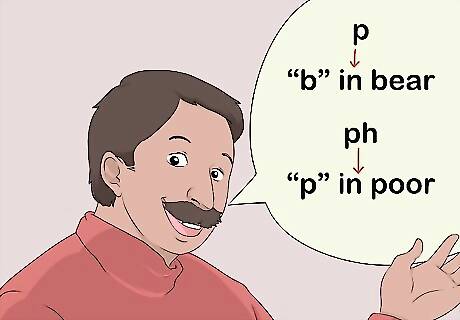
Differentiate between consonants followed by an "h." Some consonants in Taiwanese, like "p", are sometimes accompanied by an "h." This changes their pronunciation. The letter "p" in Taiwanese is pronounced like the "b" in the word "bear." If there is an "h" after the "p", however, this is pronounced like the "p" in "poor." "T" is pronounced the same as the letter "D," like in a word like "dare." When an "h" follows a "t," however, "t" is pronounced as it is in English. "K" is pronounced the same as the English "g" when it stands alone. When it's followed by an "H," the pronunciation changes to a "c" sounds, like the "c" in cow. "C", when found on its own, is pronounced the same as the English "J." When you see "ch," this is pronounced the same as it is in English, as in words like "cheese" and "checkers." "Z" is pronounced with a "ds" sound, like the end of the word "yards." When followed by an "h," it's pronounced like the "ts," like the end of words like "its."
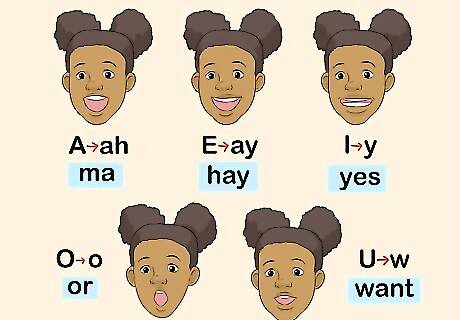
Practice vowel sounds. The vowels a, e, i, o, and u, are pronounced differently in Taiwanese than in English. Familiarize yourself with the proper pronunciations. "A" is pronounced as "ah," like the end of the English "ma." "E" is pronounced as "ay," as in the end of the English word "hay." "I" is pronounced with the "y" sound found in the English word "yes." "O" is pronounced with the "o" sound found in the English "or." "U" is pronounced with the "w" sound found in the English word "want."

Master compound vowels. Compound vowels appear frequently in Taiwanese. They are the combination of two different vowel sounds. "Ai" sounds like the middle of the word "sigh" in English. "Au" is like the middle of the word "cow." "Ia" is pronounced like end of the English sound "yah." "Iau" is pronounced like "meow." "U" is pronounced like the word "wii."
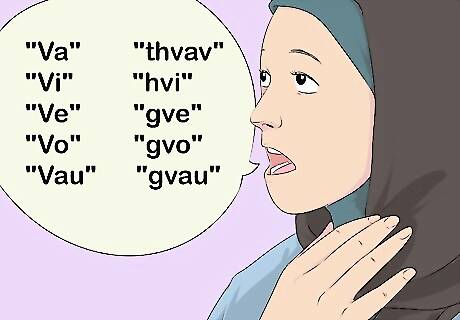
Learn nasal vowels. Nasal vowels are sounds in Taiwanese made using your nose. Learn their rough pronunciation when trying to speak Taiwanese. There are not precise words in the English language that make nasal noises, but approximate combinations of letters can help you get the right sound. "Va" sounds something like "thvav." "Vi" sounds sort of like "hvi." "Ve" sounds like "gve." "Vo" sounds like "gvo." "Vau" sounds like "gvau." "Via" sounds like "thviaf." "Viu" sounds like "sviu." "Viau" sounds like "gviau." "Voa" sounds like it is spelled, "voa." "Voai" sounds like "kvoai."

Learn ending vowels. Ending vowels end a word. Make sure you know their rough sounds if you want to speak Taiwanese. The ending "-am" is pronounced the like the word "lam." The ending "-im" is pronounced like the end of the name "Kim." The ending "iam" is pronounced like the end of the name "Liam." The ending "an" is pronounced like the end of the word "ban." The ending "in" is pronounced like the ending to "kin." The ending "un" is pronounced like the end of the word "tune." The ending "ien" is pronounced with an "ee-en" sound. The ending "oan" is pronounced sort of like the English word "won." However, the sound is longer and more drawn out and emphasis is placed on the end of the word. It's pronounced something like, "wo-awn." The ending "ang" is pronounced similar to "bang", but the "a" sounds slightly more like an "o" sound. The ending "eng" is pronounced with a hard "e" sound followed by "ng." The ending "ong" is pronounced more or less how it's spelled, like the end of the word "song." The ending "iang" is pronounced like the ending of the word "gong." The ending "iong" is pronounced like "ee-ong."
Mastering Basic Travel Phrases
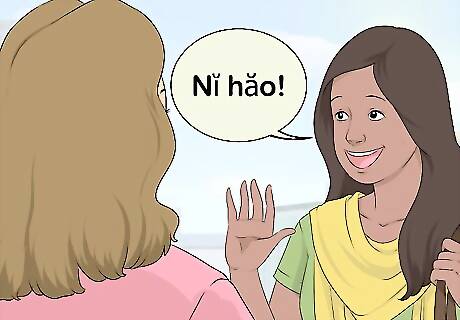
Learn to say "Hello." When greeting people in Taiwan, use the basic Taiwanese word for "hello." The words for hello are "Nĭ hăo/ Nĭn hăo", which are respectively pronounced "Nee how / Neen how." "Nĭn hăo" is a more relaxed greeting, which you can use to address friends or people close to your age. Bosses, teachers, and your elders should be addressed with "nĭ hăo."

Practice phrases that convey good manners. Please, thank you, and excuse me are used in Taiwan in the same fashion they're used in English. Make sure you know the words that convey basic manners before taking a trip to Taiwan. "Xièxie," roughly pronounced hsieh hsieh, means, "Thank you." In slightly more formal situations, opt for, "Xièxie," pronounced, "nĭ/nĭn." "Bú kèqì" is pronounced "Boo khe chee." While its rough translation is imprecise, it's generally used for phrases like "You're welcome" and "No problem." If you bump into anyone on a busy train or street, say "Bù hǎo yì si," pronounced "Boo how eeh si." This means "excuse me." If someone bumps into you and says these words, respond with "Méi yŏu wèntí," pronounced "May yo when tee." This roughly means, "No problem," which is a way to excuse someone for bumping into you.

Use the right phrases when shopping. In Taiwan, shopping is a major part of life. You should be able to ask about price, as it may not always be listed on an object. You may also experience people attempting to sell you items on the street, so learn how to politely decline. To ask how much something is, say, "Duō-shǎo-qián." This is pronounced "Doo oh show chee an." It roughly means, "How much?" To decline a street vendor attempting to sell you something, say "Bú yòng," pronounced "Boo yong." This means "How much?"
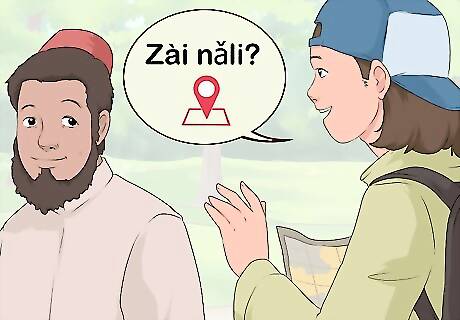
Ask for help when lost. If you ever get lost and need directions, stop someone and say, "Zài nǎli." This is pronounced, "Zeye nah lee." This conveys that you're lost and need directions.

Ask where the bathroom is. If you're in need of a restroom, the word for restroom is "Cèsuŏ." This is pronounced "Tse sue-oh" and can help you locate a bathroom when you're in need.

Express yourself when you don't understand. Learning a new language takes time, so learn to convey you're confused. The phrase "Tīng bù dǒng" is pronounced "Teeng boo dong." Its rough translation is "I don't understand."
Seeking Professional Guidance

Enroll in a Taiwanese class at your college. If you're currently a student, see if you can enroll in a Taiwanese class at your college. Taiwanese classes can be added to your course load for the semester. The assistance of a professional teacher can help you master pronunciation and basic words and phrases. If your school has a language requirement, choose Taiwanese to fulfill it if you're looking to learn the language.
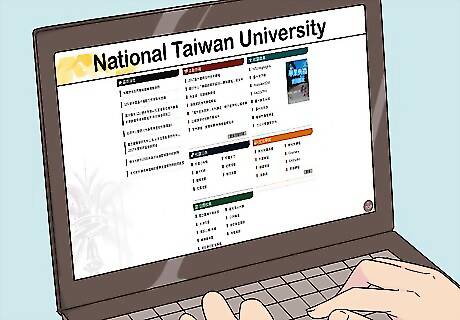
Take online classes. You may be able to find free classes online from certain universities. The National Taiwan University, for example, provides free classes online. With free classes, you can walk your way through lectures, homework, assignments and more to learn Taiwanese at your own pace.

Find a tutor. Search online for tutors in your area to see if anyone specializes in Taiwanese. The help of a private tutor can help you hone your pronunciation skills to really master the language. If you can't find a tutor in your area, consider looking for an online tutor who can teach you via video chat.

Take classes at a local community college. If you're not currently enrolled in college, community colleges often offer classes to non-students for fairly low prices. See if a local community college offers Taiwanese courses. Keep in mind, you may have to go through the application process for the college to enroll in the class depending on school policy.

Go to local language centers. If you live in a diverse area, there may be local language centers near you. Here, you can connect with people hear who speak Taiwanese. If you're already enrolled in a course, talking to native speakers regularly can help you develop your language skills. You may even find someone willing to tutor you for a fee through a language center. Colleges are often a great source of language centers, so contact a local college and ask if they have a language center on campus.




















Comments
0 comment